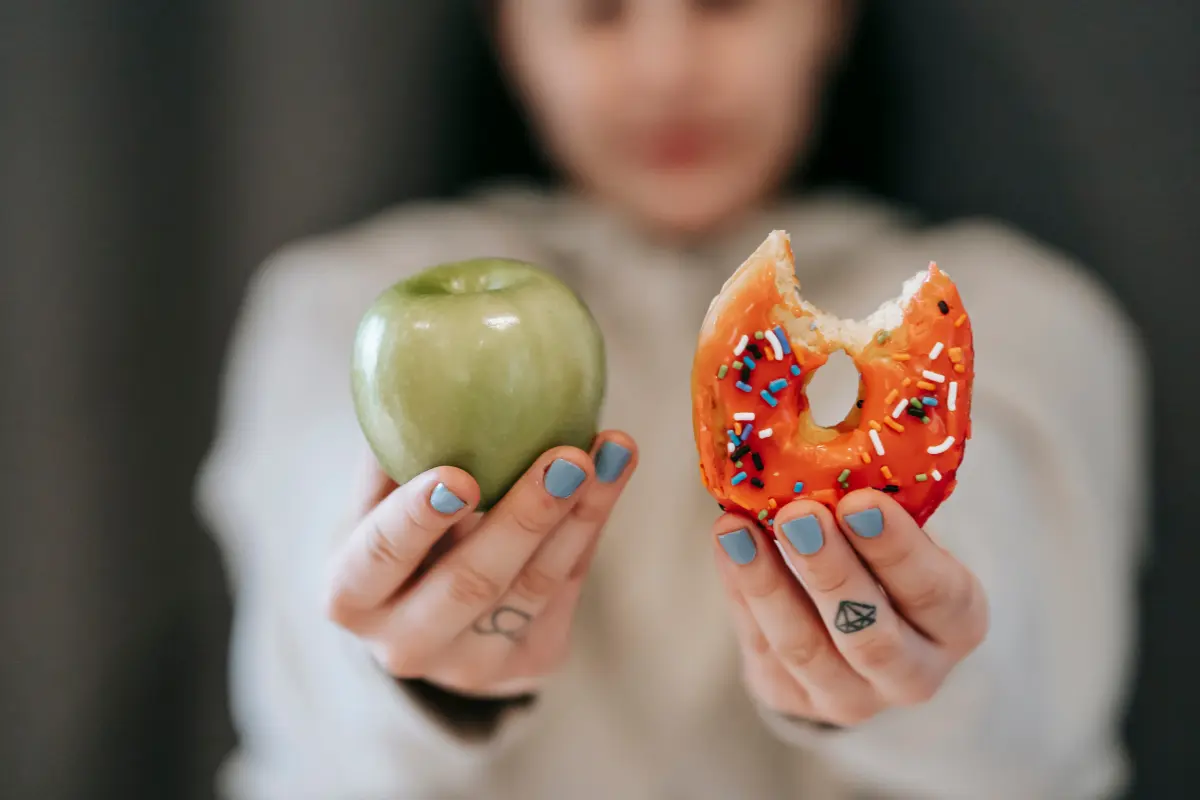
“Cheat day” is a buzz phrase that has been floating around the diet and nutrition space for years. Today, we’re chatting about how to beat the cheat day mentality so you can build trust with yourself and your relationship with the foods you choose to enjoy.
What Is Cheat Day in Nutrition?
If you hear the phrase, “cheat day,” and your brain automatically jumps to a day or meal to let loose with food choices, be more relaxed with adherence, and eat whatever you want in whatever quantities you want, you're not alone.
It is common to think about a cheat day as a “light at the end of the low-calorie tunnel.” You may even look forward to this day or meal each week as a driver to stay more consistent every other day of the week. In other words, it is a reward you give yourself for sticking with your plan.
In theory, this sounds like it could be helpful in helping create consistency with your diet long-term, right?
At WAG, we’re all about finding flexibility in your nutrition plan—in fact, we think it is a key component to healthy food relationships and long-term nutritional success.
Advertisement
That being said, there are some things to look out for from a mindset perspective when considering “cheat days” so you feel proud of your choices, build sustainable nutrition habits, and work towards your goals without frustration.
What is a Cheat Day Mentality?
Cheat day mentality is comprised of at least one (if not all) of a few core beliefs:
- You believe a cheat day is the only way to be successful on your diet and stick with it.
- Your current way of eating leaves you feeling deprived. You need something to regularly look forward to because what you're doing now doesn’t feel sustainable.
- You have seen this trend in the nutrition space and believe it will be effective for you.
Breaking through the cheat day mentality comes down to a shift in mindset. To do this, you need to understand why it can be problematic in the first place.
Are Cheat Days Bad?
Although we always recommend steering clear of “good” and “bad” language in the nutrition space, there are a few reasons why a “cheat day” can be problematic.
Let’s look at some of those reasons:
Advertisement
- It encourages an all-or-nothing mindset instead of instilling lessons of balance and moderation [1]. When you finally feel that it is “okay” to eat a certain food (usually a dessert or “junk food”), you may go overboard.
- It can lead to a “binge” mentality where instead of eating to satiety, you overindulge because you “can.” Further, it can be triggering for those with a history of disordered eating patterns [2]. An extension of the all-or-nothing mindset, the drive to eat everything and anything when it is “allowed” can cause you to eat far over satiety levels.
- It may promote the “good food” vs. “bad food” dichotomy. When you save a specific food for a “cheat day,” it generally means it isn’t a food you'd eat on a “good day.” So, when you have that “cheat day,” you may consider those foods “bad” and, as an extension, may consider yourself “bad” for choosing that food. There is no room for morality in food choices!
- It may slow progress by drastically increasing overall calorie intake [3]. Depending on how much you eat on a “cheat day,” it could drastically decrease your weekly caloric deficit, slow fat-loss progress, and increase frustration.
- It may be tougher for you to recommit to your plan if you're still craving indulgent foods [3]. The body may be primed to still want sugary, calorie-dense foods after a day of eating lots of them!
Any one of these reasons can be damaging to your mentality around health and nutrition. Unfortunately, many of them are often in play at once.
WAG Coaches have years of experience helping clients find a more effective way to add flexibility, find a realistic way of eating, and create sustainable results.
Alternatives to Cheat Days
If you've been thinking about trying a “cheat day,” it means that there is SOME part of your nutrition plan that feels limiting. When your goal is weight loss, there will likely be some level of this. After all, a calorie deficit does require you to be more intentional with the food choices you make, and this may mean a shift in food quality and quantity.
That being said, there are some creative alternatives to try that may give you the flexibility you're craving without the negative mindsets that come along with the cheat day mentality.
Try New Foods & Recipes
If you're satisfied with the foods you eat every day, you're less likely to feel the need to indulge.
Advertisement
It is common to think that healthy recipes are boring or need to include a combination of rice, chicken breasts, and broccoli. This definitely isn't the case. Here are some things to try:
- Research healthy, delicious recipes to add to your routine. If you're not a huge cooker, pick one each week.
- Swap out staples. If you like to keep things simple but want to avoid food boredom, keep recipes similar but swap out your staples. Experiment with new salad veggies, use a similar protein source (swap chicken for turkey), or try a new dressing, topping, or seasoning to add to your dinner dish. This way, you can stick with cooking methods and meals you know without it feeling overly repetitive.
- Grab a WAG meal plan. Our meal plans will take the guesswork out of your weight loss plan while teaching you that healthy doesn't have to mean boring or overcomplicated.
Plan a Treat
If you consistently struggle with a specific craving (hello, Cadbury Chocolate Eggs!), try planning the food you crave into a balanced day. If you need a little help learning how to use a food tracker, we have you covered.
If this food takes up more macros (usually carbs and fats), plan it into your day first, then plan the rest of your meals around that treat. This may mean loading up on extra protein and veggies in other meals so you have more macro wiggle room come treat time.
If you're not tracking macros, you can still utilize this concept. Enjoy one serving of a treat you crave, and think about how that fits into a balanced day. Adjust other food choices accordingly.
You can also play around with macro-friendly desserts so you can (literally) eat your cake and have it too!
Advertisement
Practice Moderation
Moderation encourages you to break free from an all-or-nothing mentality.
Moderation allows you space to learn how to incorporate foods into your nutrition plan that can satisfy your craving without feeling the need to deprive yourself and then overindulge later.
IIFYM (If-If-Fits-Your-Macros) is another popular saying in the nutrition world. It means it is possible to continue eating foods you want to eat while still sticking to your macro ratios. If you want to adopt this approach, you still need to seek out healthy alternatives to any processed foods you may crave.
At WAG, we prescribe a minimum fiber target for our clients to encourage them to make sure that they’re getting enough whole, healthy foods as they experiment with adding treats in moderation.
Identify Your WHY
Whenever you take on a huge life change like a new diet, it’s important to be clear on the WHY.
Advertisement
What do we mean by this? Think about the reasons behind why you set a certain health and nutrition goal. What is your intention? Is it to get healthier for your children? For your partner? For a career change? To feel stronger in the gym?
The more you can connect to your why, the more you will be able to focus on that and not on your urge to “cheat” on your nutrition plan.
Do You Just Need a Break?
Questions about diet breaks typically come at one of three times in your journey:
- When you first start you're already worried about feeling limited in your food quantities and choices.
- When you've been dieting for a while and feel you need a break for physical reasons.
- When you've been dieting for a while and feel you need a break from tracking for mental reasons.
If you’re dealing with situation #1, consider a few reasons why “cheat days” can be tricky from a mindset perspective. Remember that a sustainable way of eating likely needs to include a treat now in the broader context of a balanced intake. This freedom through structure is what many of our clients at WAG grow to love and get help developing when working with their coach.
But, if you have been dieting for a while, you may just need a break from dieting for physical reasons. There are a lot of metabolic adaptations that occur at lower calorie intakes. If you're having trouble eating fewer calories or noticing a drive to eat over your nutrition plan regularly, this is a sign you should listen to. In this case, raising macros and either reverse dieting or taking a diet break may be necessary.
Advertisement
Lastly, you may just be ready to try your hand at putting your food tracking app and food scale away to build trust with your body! In this case, “cheat day” is likely just a phrase you're using to describe not tracking anything if you've grown to think of tracking as the “best” thing to do. Try practicing intentional eating and letting go of strict tracking.
There are a lot of moving pieces to beating cheat day mentality and a WAG coach can help. To learn more about our programs, click here!
References:
- Hill, A. (2018). Should you have cheat meals or cheat days? Retrieved from: https://www.healthline.com/nutrition/cheat-meals#effectiveness
- Murray, S.B., Pila, E., Mond, J.M., Mitchison, D., Blashill, A.J., Sabiston, C.M., & Griffiths, S. (2018). Cheat meals: A benign or ominous variant of binge eating behavior? Appetite, 130. 274-8. doi: 10.1016/j.appet.2018.08.026.
- Fitzpatrick, K. (2019). Are cheat meals bad for you? Retrieved from: https://greatist.com/health/cheat-days-explained#physical-effects
Schedule a Free Intro Call
Working Against Gravity has led the macro tracking and health space for over a decade. Our team doesn’t just understand the science of nutrition—we’ve spent years mastering the art of tailoring it to fit your life. That means no cookie-cutter plans, just real strategies that have worked for over 30,000 people.
Schedule a free call with our team to learn how working with a 1-on-1 WAG coach will help you reach your goals.



